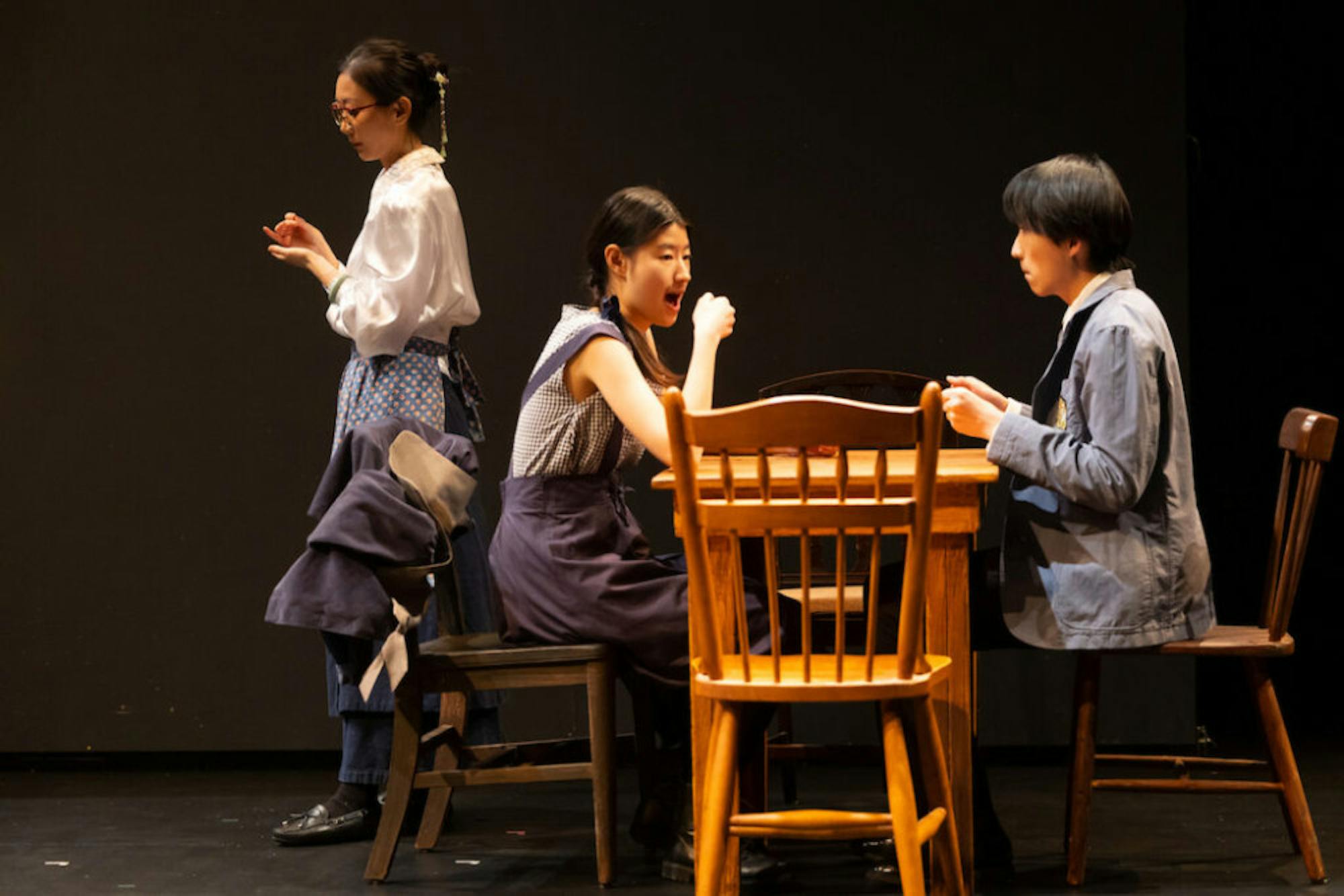The audience sat around the circular stage in the Schwartz Center Theater, the line between onlookers and performers blurring as we were introduced to the small, New England town called Grover’s Corners. At times, it felt like the audience was a part of the town.
Emory Theater’s production of Thornton Wilder’s play, “Our Town,” ran from Feb. 16 to Feb. 26. The play was originally created in 1938, and Emory’s production was adapted from a 2017 multilingual translation by Nilo Cruz and Jeff Augustin, produced by Miami New Drama. The play was co-directed by Assistant Professor of Theater Studies Lydia Fort and Horizon Theatre Company Associate Artistic Producer Marguerite Hannah.

This multilingual production of “Our Town” came about as an attempt to better represent the multiculturalism of Emory. The original translation by Cruz and Augustin includes English, Spanish and Creole, but Fort explained that the change to Mandarin better represented the Emory community.
“Being inclusive in the way we are culturally trying to interpret it now means we are trying to allow the specificity of our cultural experience inform a moment, as opposed to simply seeing a representation of somebody and saying, ‘You are included because I allowed you into the space,’” Hannah said in a February Creativity Conversation.
“Our Town” is a classic American play that focuses on the lives of Grover’s Corners residents in the early 1900s. It features a plethora of characters, but zooms into the Webb and Gibbs families in depth. In particular, we see the elder Gibbs son, George (Tom Zhang (17C)) and the elder Webb daughter, Emily (Ashley Alves (24C)), grow up, fall in love and grieve. The play gives us a window into the relationships and experiences that intersect these two families and individuals.
“The characters are all obviously from different backgrounds and they speak different languages, … and that arc that you see from Act I to Act III is so different,” Alves said. “And seeing the characters grow is so fun and makes me fall in love with the stories that they have to say.”
The multilingual adaptation of “Our Town” feels right. This play seeks to capture life through the lenses of individuals that make up a community. Life, as the play presents it, is challenging, messy and full of love and beauty. This experience of life is true everywhere and broadening the play’s cultural scope only makes it a more complete and true picture.
“Making this multilingual … makes it very relatable for a lot of people and makes it more universal,” George Gibbs understudy Alex Mao (26C) said. “The idea of cherishing life is not just for Americans or for English speakers, but also for Spanish speakers or Mandarin speakers or the whole world.”
As per Wilder’s original stage notes, sets and props are very minimal; about a dozen chairs lined the stage and were the primary set and prop pieces of the play. The absence of sets and props compelled the audience to focus on the characters of the play. The story focuses on movement and space as a way to build relationships among the characters. This emphasis on gesture connects to the multilingual aspects of the play as well.
“There are some moments in the play where I do not care what language they are speaking,” Hannah said. “It is very clear what is happening. When the moment is flushed, you really don’t need to know what they’re saying.”
Supertitles above the stage area projected each line translated into English, Spanish and Mandarin. I ended up focusing less on understanding the meaning of each word, but rather recognizing the body language and tone associated with the words.
At the end of Act I, Emily speaks to her father (Cristian Gonzalez) as she gazes at the moon from her window. Language wasn’t necessary to understand the tenderness between the father and daughter—the weight of the moment as Emily grows into an adult.
Hannah and Fort both emphasized this production as the beginning of a new way to think about this play.
“Regardless of how far the end result reads, I think that we have explored a lot of things that can be used going forward for other productions,” Hannah said.
However future theaters might use this production of “Our Town,” it remains a stunning adaptation—a love letter of life to the Emory community. One of my favorite moments of the play was when George and Emily look out their windows at the moon while a choir sings in the distance. As the two children come of age, we are allowed to revel in the wonder of small joys. Life might be chaotic, but the moon is always shining.
Update (3/5/23 at 6:19 p.m.): The article has been updated to specify that Lydia Fort is an assistant professor of theater studies.





